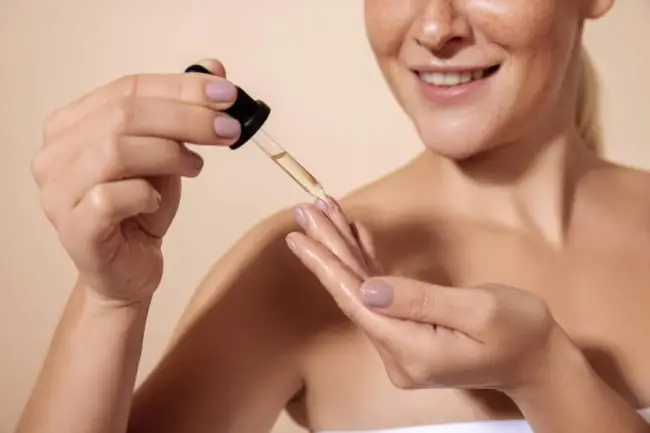Dry skin can feel uncomfortable, look pale, and sometimes even lead to irritation or redness. If you’ve been struggling with dry skin, you’re not alone. Fortunately, nature has provided us with countless remedies to restore moisture and radiance to our skin.
From the foods we eat to the oils we apply, there are many natural ways to nourish and hydrate our dry skin.
So, if you’re looking to say goodbye to dry skin and welcome a soft, glowing complexion, you’ve come to the right place. We have come to you with simple yet effective natural hydration secrets to help your skin feel its best.
Before discussing the solutions, it’s essential to understand why dry skin happens in the first place. Dry skin, or xerosis, occurs when your skin lacks moisture and natural oils.
It can make the skin appear flaky, rough, or tight, especially in certain areas like your face, arms, and legs.
Common Causes of Dry Skin
Several factors contribute to dry skin, and identifying them can help you target the right solutions. Some common causes include:
- Environmental Factors: Cold weather, hot showers, or dry indoor heating can strip your skin of moisture.
- Harsh Skin Products: Many commercial skincare products contain alcohol and artificial fragrances that can dry out the skin.
- Genetics: Some people are more predisposed to dry skin due to their genetic makeup.
- Underlying Health Conditions: Conditions like eczema, psoriasis, and diabetes can make your skin more susceptible to dryness.
- Dehydration: Not drinking enough water can leave your skin dry.
How Climate and Seasonality Influence Skin Hydration
In Spain, the climate varies greatly from region to region. Coastal areas like Barcelona may experience a humid climate, while inland cities such as Madrid face dry, hot summers and cold winters. This fluctuation can affect your skin’s hydration levels.
During the winter months, the air tends to be drier, and indoor heating systems can exacerbate dryness. In contrast, summer heat can lead to excessive sweating and dehydration.
Understanding how the seasons impact your skin will help you adjust your skincare routine accordingly.
The Importance of Skin Barrier Function
Your skin’s outer layer acts as a protective barrier that locks in moisture and prevents harmful substances from entering.
When the skin barrier is compromised, moisture escapes, leading to dryness and irritation. A strong skin barrier is essential for healthy hydration. Therefore, maintaining a healthy skin barrier is key to naturally hydrated skin.
Essential Natural Hydration Strategies
Now, let’s discover some practical, all-natural strategies to keep your dry skin beautifully hydrated.
The Power of Natural Oils: Coconut, Argan, and Jojoba
Oils are some of the best natural moisturizers available. They contain fatty acids that nourish the skin and seal in moisture. Here are three oils that are particularly effective for dry skin:
- Coconut Oil: Known for its antimicrobial properties, coconut oil also deeply hydrates and soothes dry skin.
- Argan Oil: Rich in antioxidants and essential fatty acids, argan oil helps restore elasticity and hydrate the skin.
- Jojoba Oil: This oil closely resembles the natural oils produced by your skin, making it perfect for replenishing moisture without clogging pores.
Simply apply a small amount of any of these oils to your face or body after showering to lock in hydration.
Creating Hydrating DIY Face Masks with Everyday Ingredients
You don’t need to spend a fortune on skincare products to get soft, hydrated skin. Many natural ingredients found in your kitchen can be turned into DIY face masks. Here are a couple of simple recipes:
- Honey and Avocado Mask: Mash half an avocado and mix it with one tablespoon of honey. Both ingredients are known for their moisturizing properties. Apply the mask to your face and leave it on for 15–20 minutes before rinsing with warm water.
- Oatmeal and Yogurt Mask: Oatmeal has soothing properties, and yogurt is rich in moisture. Combine the two for a calming mask that will leave your skin feeling nourished.
Hydrating Foods: What to Eat for Skin Health
Hydration doesn’t just come from topical applications what you put into your body is just as important. Here are some foods to add to your diet for glowing, hydrated skin:
- Water-rich Vegetables: Cucumbers, celery, and lettuce are packed with water and help keep your skin hydrated.
- Fatty Fish: Salmon, sardines, and mackerel are rich in omega-3 fatty acids, which help maintain your skin’s natural moisture barrier.
- Nuts and Seeds: Walnuts, almonds, and chia seeds are great sources of healthy fats and antioxidants that keep your skin moisturized from the inside out.
- Berries: Rich in vitamin C, berries help boost collagen production and keep your skin looking youthful.
Life-Changing Sustainable Habits for Moisturized Skin
Adding sustainable habits into your skincare routine can make a significant difference in the health and hydration of your skin. Here are some life-changing habits to consider:
- Daily Hydration: Drink plenty of water throughout the day to keep your skin hydrated from within.
- Avoid Hot Showers: While hot showers feel good, they can strip moisture from your skin. Go for lukewarm water instead.
- Humidifier: Using a humidifier during the winter months can add moisture to the air and prevent your skin from drying out.
The Role of Water: How Much Do You Really Need?
You’ve likely heard the saying, “Drink eight glasses of water a day,” but is that really necessary? While individual water needs vary, staying well-hydrated is important for maintaining healthy, hydrated skin. Aim to drink around two liters of water per day, adjusting based on your activity level and climate.
Minimizing Harsh Chemicals and Their Impact on Skin
Many commercial skincare products contain harsh chemicals like parabens, sulfates, and artificial fragrances that can damage your skin and strip away its natural moisture.
When choosing products, look for those labeled “gentle,” “hypoallergenic,” or “for sensitive skin.”
Gentle Skincare Routines: Choosing the Right Products
To support natural hydration, it’s important to follow a gentle skincare routine. Here are some tips:
- Use a Cream Cleanser: Instead of foaming cleansers, go for cream-based cleansers that are less drying.
- Avoid Exfoliating Too Often: Over-exfoliating can irritate the skin and worsen dryness. Exfoliate once or twice a week to remove dead skin cells without causing damage.
Expert Insight on Holistic Hydration
According to dermatologists, achieving optimal skin hydration requires a holistic approach. It’s not just about slathering on lotions and oils; it’s about balancing your lifestyle, diet, and skincare habits.
A consistent skincare routine combined with a healthy diet and sufficient water intake is key to maintaining hydrated skin.
Embracing Ayurveda: Ancient Secrets for Modern Hydration
Ayurveda, the ancient Indian system of medicine, offers natural hydration tips that are still relevant today.
According to Ayurvedic principles, balancing your doshas (body energies) can help optimize hydration. For instance, herbal teas made with ingredients like chamomile, aloe vera, and ginger are known to improve skin health and hydration.
Hydration from Within: The Connection Between Diet and Skin
Diet plays a huge role in skin hydration. Eating nutrient-dense foods rich in vitamins and minerals supports skin health from the inside out.
Vitamins A, C, and E are particularly important for keeping skin hydrated and protected from environmental stressors.
Actionable Tips for Skin Care Enthusiasts
In Spain, local ingredients such as olive oil, honey, and aloe vera have been used for centuries to hydrate and nourish the skin.
Adding these into your skincare routine is a wonderful way to stay connected to local traditions while benefiting from their natural moisturizing properties.
Conclusion
Dry skin doesn’t have to be a constant struggle. By embracing these natural hydration secrets, you can transform your skin from dry and dull to soft, glowing, and healthy.
Whether it’s through the use of nourishing oils, hydrating foods, or sustainable skincare practices, there’s no shortage of ways to say goodbye to dry skin and welcome a hydrated, vibrant complexion.
Take a holistic approach hydrate from the inside out, and choose skincare products and practices that align with your natural beauty.
FAQs
What is the best natural hydration for the skin?
Natural oils like coconut, argan, and jojoba oil are excellent for hydrating the skin. Additionally, eating water-rich foods and drinking plenty of water can help hydrate your skin from the inside.
How do you super hydrate dry skin?
Super-hydrating dry skin involves using rich, natural moisturizers like oils, masks, and lotions while ensuring you’re drinking plenty of water and eating foods high in omega-3 fatty acids and antioxidants.
What drink helps dry skin?
Water is the most essential drink for dry skin. Additionally, herbal teas like chamomile, aloe vera, and green tea can promote hydration and skin health.
What is the best hydration drink for dry skin?
A combination of water and hydrating teas, like coconut water, is ideal for keeping dry skin moisturized and nourished.







